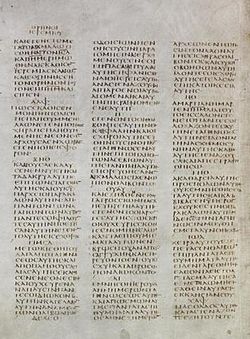
Back Klaagliedere van Jeremia Afrikaans سفر مراثي إرميا Arabic ܣܦܪܐ ܕܐܘܠܝܬܐ ܕܐܪܡܝܐ ARC سفر مراثى ارميا ARZ Klageliada BAR Кніга Плач Ераміі Byelorussian Книга Плач Иеремиев Bulgarian Keinvanoù Breton Llibre de les lamentacions Catalan Ià-lé-mī Aĭ-gŏ̤ CDO
 | |||||
| Tanakh (Judaism) | |||||
|---|---|---|---|---|---|
|
|
|||||
| Old Testament (Christianity) | |||||
|
|
|||||
| Bible portal | |||||


The Book of Lamentations (Hebrew: אֵיכָה, ʾĒḵā, from its incipit meaning "how") is a collection of poetic laments for the destruction of Jerusalem in 586 BCE.[1] In the Hebrew Bible, it appears in the Ketuvim ("Writings") as one of the Five Megillot ("Five Scrolls") alongside the Song of Songs, Book of Ruth, Ecclesiastes, and the Book of Esther. In the Christian Old Testament, it follows the Book of Jeremiah, for the prophet Jeremiah is traditionally understood to have been its author.[2][3] By the mid-19th century, German scholars doubted Jeremiah's authorship, a view that has since become the prevailing scholarly consensus.[4] Most scholars also agree that the Book of Lamentations was composed shortly after Jerusalem's fall in 586 BCE.[5]
Some motifs of a traditional Mesopotamian "city lament" are evident in the book, such as mourning the desertion of the city by God, its destruction, and the ultimate return of the deity; others "parallel the funeral dirge in which the bereaved bewails... and... addresses the [dead]".[2] The tone is bleak: God does not speak, the degree of suffering is presented as overwhelming, and expectations of future redemption are minimal. Nonetheless, the author repeatedly makes clear that the city—and even the author himself—has profusely sinned against God, thus justifying God's wrath. In doing so, the author does not blame God but rather presents God as righteous, just, and sometimes even merciful.
- ^ Berlin 2004, p. 1.
- ^ a b Hayes 1998, p. 168.
- ^ Berlin 2018, p. 1163.
- ^ Salters, Robert B. (2010). Lamentations: A Critical and Exegetical Commentary. Bloomsbury Publishing. pp. 4–7. ISBN 978-0-567-03037-5.
- ^ Young, Ian; Rezetko, Robert; Ehrensvärd, Martin (2017). Linguistic Dating of Biblical Texts: Volume 2. Routledge. p. 65. ISBN 978-1-351-56005-4.
© MMXXIII Rich X Search. We shall prevail. All rights reserved. Rich X Search